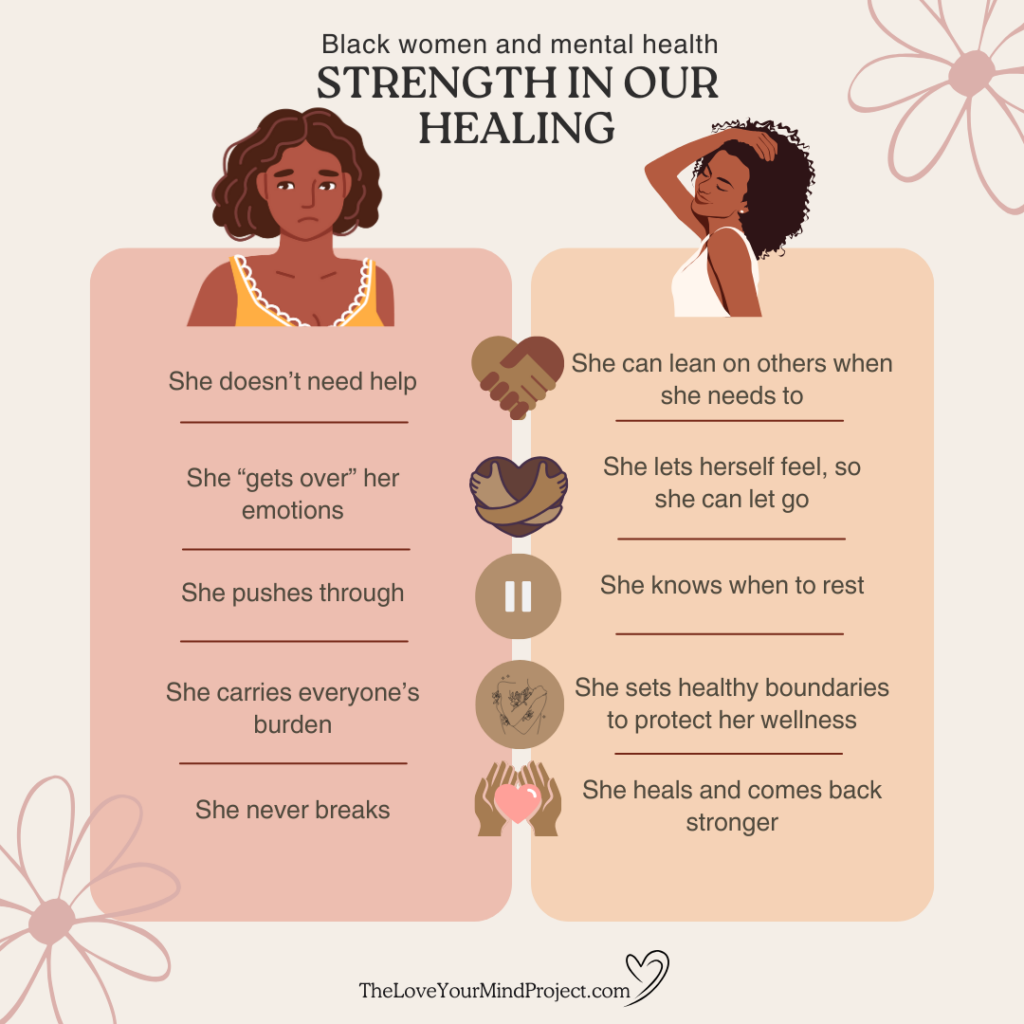- How emotions show up in the body (and why it matters) - February 6, 2026
- How to heal from emotional abuse: A Black woman’s guide to gentle rebuilding - January 29, 2026
- How to process emotions: What it really means and why it’s essential for Black women - January 22, 2026
Caring for our minds is a radical act of self-love. That’s why it’s time we mend the broken relationship between Black women and mental health — because we (you) are worthy of care.

Note from the author: This is a personal plea for my sisters. I am a successful, educated Black woman who loves and lives for God. I also deal with symptoms of anxiety and depression. Addressing my emotional needs gave me life. As Black women, I hope we can begin to see and treat ourselves as the beautiful human beings we are. My mission is to help you get to know your mind so you can better support it — and have the strength to thrive in every area of your life.
We’re human. Why is that so hard for us to embrace?
It could be because society doesn’t always treat us like humans. Or it’s survival. When you find yourself in unbearable circumstances, you do what you need to do, mentally and emotionally, to get through.
Still, we’re human. We have muscles that can tear, bones that can break, and organs that can wear down — including our minds.
When injured, it hurts whether you admit it or not. Neglecting an injury only makes it worse.
Our minds have been neglected for too long. This article explores the barriers we face in caring for our mental health and how we can begin to heal.
Our mental health matters
Some studies report women, in general, being more likely than men to have anxiety and depression symptoms 1,2 — yet we are less likely to get mental health help compared to white women 3,4.
That’s a powerful statistic, considering much of our pain likely goes unreported.
Our world can be a lot. We’re constantly bombarded with heavy news — political tension, extremism, natural disasters, and religious conflict on top of the pressures of work, family, finances, and health.
If the mind is processing more than before, maybe we should do more to tend to it. What helped older generations cope may not fit our needs for today.
Ignoring our mental health only hurts us. So, let’s acknowledge what stands in our way and face it head-on because we are that strong.
Barriers to Black women’s mental health care
Here are some of the most common barriers to our mental wellness and how we can begin to break through them.
Limited access to providers who “get us”
Let’s be real. Many predominantly Black communities are under-resourced. We’ve seen how disinvestment affects our schools, libraries, and hospitals 5. So, you may not have a lot of options for quality care.
If you do have access to care, it’s not cheap — especially without insurance.
And honestly, who wants to spend the money, time, and energy on a therapist who doesn’t understand what it means to move through this world as a Black woman?
There aren’t enough culturally competent mental health professionals, but they do exist 6.
You can find Black therapists, counselors, support groups, and more when you’re ready for more help.
Trust the healthcare system, really?
The U.S. medical system doesn’t always treat us fairly, to say the least. As late as the 1970s, our country was sterilizing women of color, believing we weren’t fit to breed 7
Beyond the infamous, egregious acts, there’s still bias. Black women are more likely to be diagnosed with psychotic disorders than mood disorders compared to white women with the same symptoms 8.
So yes, skepticism is valid. But completely disconnecting ourselves from care costs us.
You have complete control of your mental health — allowed to ask questions, research symptoms and treatment options, advocate for yourself, and get a second, third, or fourth opinion if needed.
You can be cautious of the system without being cut off.

The strong Black woman myth
The strong Black woman doesn’t need help. She bears the weight of the world as she carries her family and sacrifices for others. Unbothered by what goes on around her, she has thick skin.
As heroic as this woman sounds, she’s not okay 9.
We’re strong, no doubt. But it’s not because we downplay our feelings, deny help, and ignore our needs.
The truly strong Black woman is not afraid to feel or lean on others when she hits a wall.
She prioritizes her mental and emotional needs so that she can heal and recover from any experience with an undeniable resilience.
God should be enough
We can and should bring our hurt and pain to God. In prayer, we can release our heaviest burdens and be filled with more of Him.
But what happens when you don’t know how to release the hurt? What happens when you pick it right back up after every deliverance session?
Listen, we can stay in our prayer closets as long as we want. But without knowing how to process and release pain, it sits and festers — negatively impacting how we see ourselves, others, and even God.
Unresolved hurt can turn us into cynics, hopeless and bitter because we haven’t yet seen a breakthrough.
Faith and mental health aren’t at odds. Supporting your mind doesn’t undercut what God is doing in your life — because nothing can.
So, love your mind and your whole self in the same way your Creator loves you.
And as your mind heals from past hurt and trauma, you’ll see how much easier it is to meditate on God’s love, receive His peace, hear His voice, and live out your purpose.
How to overcome the barriers between Black women and mental health
Prioritizing your wellness isn’t always easy, but you can choose self-love over stigma. Here’s how.
See yourself as human
You’re not a machine. You weren’t made to grind 24/7, holding in all of your pain while you bear others’.
As Black women, we’re allowed to have emotions — positive and negative ones. We don’t always have it together. Sometimes, we’re tired. That’s okay. Some days are the worst. Let it be.
You are human, and that is more than enough. Allow yourself to make mistakes, get help, and receive the love, peace, and support you deserve.
Understand the role of emotions
Feelings aren’t good or bad. They’re our brain interpreting an experience as positive or negative 10.
Uncomfortable feelings can often communicate an unmet need. And when we add judgment, guilt, or shame to how we feel, we can overlook the message and ignore the need 11. This often magnifies the pain and feeds conditions like anxiety, depression, and suicidal thoughts 12.
With the right tools and support, you can learn to listen to your emotions, uncover your needs, and address them so you can heal.
Fight for your life
As with most things in life, your mental health is a journey. You’ll likely face highs and lows. Some people will understand. Others won’t.
For every hurdle that stands in the way of your healing, know that it’s worth the fight.
With the skills to understand and address your emotional needs, you can reclaim your peace and joy. You can unlock resilience and no longer be captive to hurt, pain, or fear.
This journey is worth what it takes to heal.
Black women and mental health FAQs
How do I overcome the fear of being judged for seeking help?
It’s normal to be impacted by others’ opinions, especially those you trust and respect. But the decision to seek mental health help is yours. You know how you feel and what you’ve experienced more than anyone around you. Trust yourself to make the best decisions for you. Lean on those who support you and set healthy boundaries with those who don’t.
Can therapy really help me heal?
Yes, over time, therapy can help you recover from trauma, abuse, loss, and more by giving you the tools to identify, express, and process overwhelming emotions. But it’s important to find a therapist you trust and connect with and who has experience handling the symptoms you face.
What are the first steps if I think I’m ready for mental health support?
You can start by finding a therapist or counselor to share what you’re dealing with. Talk to your doctor if you struggle with severe, debilitating symptoms like overwhelming sadness or paranoia. If you have thoughts of suicide or self-harm, call or text 988 to connect with a trained counselor with the Suicide & Crisis Lifeline.
References
1 Office. (2025). Anxiety. U.S. Food and Drug Administration. https://www.fda.gov/consumers/womens-health-topics/women-and-anxiety
2 Albert, P. R. (2015). Why is depression more prevalent in women? Journal of Psychiatry and Neuroscience, 40(4), 219–221. https://doi.org/10.1503/jpn.150205
3 Ward, E. C., & Heidrich, S. M. (2009). African American women’s beliefs about mental illness, stigma, and preferred coping behaviors. Research in Nursing & Health, 32(5), 480–492. https://doi.org/10.1002/nur.20344
4 Perez, N. B., Lanier, Y., & Squires, A. (2020). Inequities along the Depression Care Cascade in African American Women: An Integrative Review. Issues in Mental Health Nursing, 42(8), 720–729. https://doi.org/10.1080/01612840.2020.1853289
5 Neighborhood poverty | National Equity Atlas. (2022). Nationalequityatlas.org. https://nationalequityatlas.org/indicators/Neighborhood_poverty
6 Ajluni, V., & Michalopoulou, G. (2025). Addressing the Underrepresentation of African American Mental Health Professionals: A Call to Action. Journal of Patient Experience, 12. https://doi.org/10.1177/23743735241307382
7 Eugenics and Scientific Racism. (2022). Genome.gov. https://www.genome.gov/about-genomics/fact-sheets/Eugenics-and-Scientific-Racism
8 Richards, E. (2021, September 23). The State of Mental Health of Black Women: Clinical Considerations. Psychiatric Times. https://www.psychiatrictimes.com/view/the-state-of-mental-health-of-black-women-clinical-considerations
9 Woods-Giscombe, C., Robinson, M. N., Carthon, D., Devane-Johnson, S., & Corbie-Smith, G. (2016). Superwoman Schema, Stigma, Spirituality, and Culturally Sensitive Providers: Factors Influencing African American Women’s Use of Mental Health Services. Journal of Best Practices in Health Professions Diversity : Research, Education and Policy, 9(1), 1124. https://pmc.ncbi.nlm.nih.gov/articles/PMC7544187/
10 Goran Šimić, Mladenka Tkalčić, Vana Vukić, Damir Mulc, Španić, E., Šagud, M., Olucha-Bordonau, F. E., Vukšić, M., & Hof, P. R. (2021). Understanding Emotions: Origins and Roles of the Amygdala. Biomolecules, 11(6), 823–823. https://doi.org/10.3390/biom11060823
11 The Key Skill We Rarely Learn: How to Feel Your Feelings. (2020). Psychology Today. https://www.psychologytoday.com/us/blog/harnessing-principles-of-change/202010/the-key-skill-we-rarely-learn-how-to-feel-your-feelings
12 Cohen, L. (2021, May 24). “I’M NOT GOOD ENOUGH!”: SELF-COMPARISON AND SELF-JUDGMENT IN SOCIAL ANXIETY – National Social Anxiety Center. National Social Anxiety Center. https://nationalsocialanxietycenter.com/2021/05/24/im-not-good-enough-self-comparison-and-self-judgment-in-social-anxiety/
